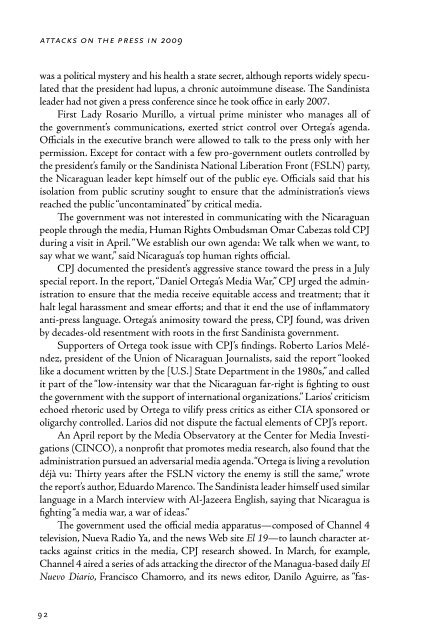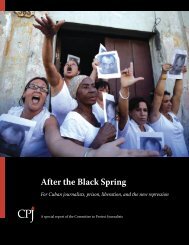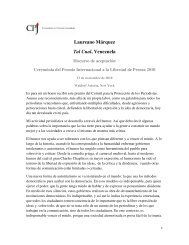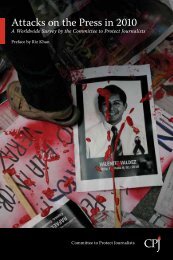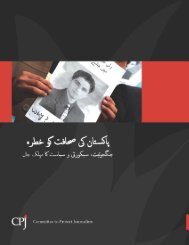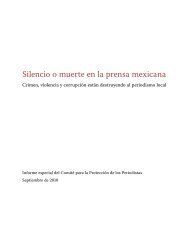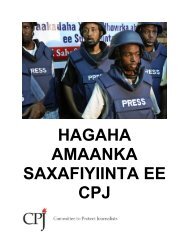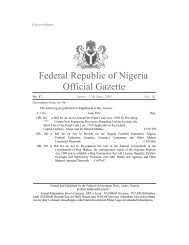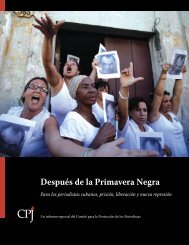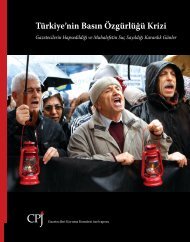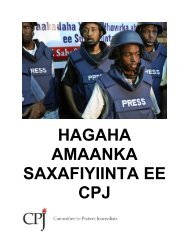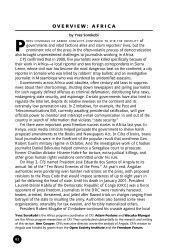Attacks on the Press - Committee to Protect Journalists
Attacks on the Press - Committee to Protect Journalists
Attacks on the Press - Committee to Protect Journalists
- No tags were found...
Create successful ePaper yourself
Turn your PDF publications into a flip-book with our unique Google optimized e-Paper software.
attacks <strong>on</strong> <strong>the</strong> press in 2009americas: nicaraguawas a political mystery and his health a state secret, although reports widely speculatedthat <strong>the</strong> president had lupus, a chr<strong>on</strong>ic au<strong>to</strong>immune disease. The Sandinistaleader had not given a press c<strong>on</strong>ference since he <strong>to</strong>ok office in early 2007.First Lady Rosario Murillo, a virtual prime minister who manages all of<strong>the</strong> government’s communicati<strong>on</strong>s, exerted strict c<strong>on</strong>trol over Ortega’s agenda.Officials in <strong>the</strong> executive branch were allowed <strong>to</strong> talk <strong>to</strong> <strong>the</strong> press <strong>on</strong>ly with herpermissi<strong>on</strong>. Except for c<strong>on</strong>tact with a few pro-government outlets c<strong>on</strong>trolled by<strong>the</strong> president’s family or <strong>the</strong> Sandinista Nati<strong>on</strong>al Liberati<strong>on</strong> Fr<strong>on</strong>t (FSLN) party,<strong>the</strong> Nicaraguan leader kept himself out of <strong>the</strong> public eye. Officials said that hisisolati<strong>on</strong> from public scrutiny sought <strong>to</strong> ensure that <strong>the</strong> administrati<strong>on</strong>’s viewsreached <strong>the</strong> public “unc<strong>on</strong>taminated” by critical media.The government was not interested in communicating with <strong>the</strong> Nicaraguanpeople through <strong>the</strong> media, Human Rights Ombudsman Omar Cabezas <strong>to</strong>ld CPJduring a visit in April. “We establish our own agenda: We talk when we want, <strong>to</strong>say what we want,” said Nicaragua’s <strong>to</strong>p human rights official.CPJ documented <strong>the</strong> president’s aggressive stance <strong>to</strong>ward <strong>the</strong> press in a Julyspecial report. In <strong>the</strong> report, “Daniel Ortega’s Media War,” CPJ urged <strong>the</strong> administrati<strong>on</strong><strong>to</strong> ensure that <strong>the</strong> media receive equitable access and treatment; that ithalt legal harassment and smear efforts; and that it end <strong>the</strong> use of inflamma<strong>to</strong>ryanti-press language. Ortega’s animosity <strong>to</strong>ward <strong>the</strong> press, CPJ found, was drivenby decades-old resentment with roots in <strong>the</strong> first Sandinista government.Supporters of Ortega <strong>to</strong>ok issue with CPJ’s findings. Rober<strong>to</strong> Larios Meléndez,president of <strong>the</strong> Uni<strong>on</strong> of Nicaraguan <strong>Journalists</strong>, said <strong>the</strong> report “lookedlike a document written by <strong>the</strong> [U.S.] State Department in <strong>the</strong> 1980s,” and calledit part of <strong>the</strong> “low-intensity war that <strong>the</strong> Nicaraguan far-right is fighting <strong>to</strong> oust<strong>the</strong> government with <strong>the</strong> support of internati<strong>on</strong>al organizati<strong>on</strong>s.” Larios’ criticismechoed rhe<strong>to</strong>ric used by Ortega <strong>to</strong> vilify press critics as ei<strong>the</strong>r CIA sp<strong>on</strong>sored oroligarchy c<strong>on</strong>trolled. Larios did not dispute <strong>the</strong> factual elements of CPJ’s report.An April report by <strong>the</strong> Media Observa<strong>to</strong>ry at <strong>the</strong> Center for Media Investigati<strong>on</strong>s(CINCO), a n<strong>on</strong>profit that promotes media research, also found that <strong>the</strong>administrati<strong>on</strong> pursued an adversarial media agenda. “Ortega is living a revoluti<strong>on</strong>déjà vu: Thirty years after <strong>the</strong> FSLN vic<strong>to</strong>ry <strong>the</strong> enemy is still <strong>the</strong> same,” wrote<strong>the</strong> report’s author, Eduardo Marenco. The Sandinista leader himself used similarlanguage in a March interview with Al-Jazeera English, saying that Nicaragua isfighting “a media war, a war of ideas.”The government used <strong>the</strong> official media apparatus—composed of Channel 4televisi<strong>on</strong>, Nueva Radio Ya, and <strong>the</strong> news Web site El 19—<strong>to</strong> launch character attacksagainst critics in <strong>the</strong> media, CPJ research showed. In March, for example,Channel 4 aired a series of ads attacking <strong>the</strong> direc<strong>to</strong>r of <strong>the</strong> Managua-based daily ElNuevo Diario, Francisco Chamorro, and its news edi<strong>to</strong>r, Danilo Aguirre, as “fas-cists.” The paper’s dismissal of reporter Eloisa Ibarra became pretext for a smearcampaign that included a pho<strong>to</strong> m<strong>on</strong>tage linking Chamorro and Aguirre <strong>to</strong> Naziswastikas. Ibarra said she was fired for uni<strong>on</strong> activism; El Nuevo Diario said it wasover her performance.t o p developments»»Ortega administrati<strong>on</strong> marginalizesprivate media.»»Authorities use legal harassment,smears against critics.0key statisticNumber of press c<strong>on</strong>ferences heldby Ortega since taking office.The most egregious exampleof government intimidati<strong>on</strong>was aimed at CarlosFernando Chamorro, formeredi<strong>to</strong>r of <strong>the</strong> Sandinista magazineBarricada in <strong>the</strong> 1980s,who now runs <strong>the</strong> magazineC<strong>on</strong>fidencial, serves as presiden<strong>to</strong>f CINCO, and hosts<strong>the</strong> televisi<strong>on</strong> news programs“Esta Semana” (This Week)and “Esta Noche” (ThisNight). Chamorro is <strong>on</strong>e of <strong>the</strong> most critical and best-known journalists in <strong>the</strong>country. It was <strong>on</strong> “Esta Semana” that Chamorro exposed a multimilli<strong>on</strong>-dollarex<strong>to</strong>rti<strong>on</strong> scheme involving <strong>the</strong> Sandinista Party and influence peddling in <strong>the</strong>judiciary.After <strong>the</strong> s<strong>to</strong>ry aired in 2007, Channel 4 and Nueva Radio Ya broadcast unfoundedads c<strong>on</strong>necting Chamorro <strong>to</strong> internati<strong>on</strong>al drug trafficking. The governmentintensified its attack in September 2008, launching an inquiry in<strong>to</strong> whe<strong>the</strong>rCINCO and o<strong>the</strong>r n<strong>on</strong>profits were illegally funneling foreign investments <strong>to</strong>o<strong>the</strong>r civil society groups. CINCO’s Managua offices were raided and Chamorrowas interrogated.In February 2009, after an internati<strong>on</strong>al outcry, <strong>the</strong> At<strong>to</strong>rney General’s officedropped <strong>the</strong> criminal case against CINCO and <strong>the</strong> o<strong>the</strong>r organizati<strong>on</strong>s. Chamorrocredited internati<strong>on</strong>al attenti<strong>on</strong> for <strong>the</strong> government’s decisi<strong>on</strong> <strong>to</strong> drop <strong>the</strong> matter.“Thanks <strong>to</strong> this wave of nati<strong>on</strong>al and internati<strong>on</strong>al solidarity, this case set aprecedent: When citizens are right and express <strong>the</strong> truth, especially when <strong>the</strong>yare driven <strong>to</strong> resist and not <strong>to</strong> be intimidated, so<strong>on</strong>er or later <strong>the</strong> government willhave <strong>to</strong> take a step back,” he wrote in C<strong>on</strong>fidencial.Private media executives complained about a biased system of distributinggovernment advertising that effectively punished critical outlets while rewardingsupportive press. The Sandinista government spent 80 percent of its US$3.5milli<strong>on</strong> advertising budget in 2007-08 for spots <strong>on</strong> Channel 4, which is runby Ortega’s s<strong>on</strong>s, according <strong>to</strong> C<strong>on</strong>fidencial. Administrati<strong>on</strong> officials said <strong>the</strong>ywere following practices established by <strong>the</strong>ir predecessors. Preceding governments,for example, had boycotted Sandinista media, human rights ombudsman9 29 3


